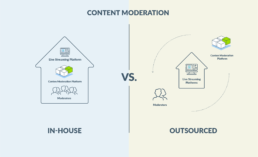Content Moderation: In-House vs Outsourced
Effective community management for your online platform relies on high-quality content moderation. With tons of user-generated content that needs to be reviewed continuously, you’re surely pondering how to go about handling your moderation needs — with an outlook for scaling your business.
The in-house vs. outsource dilemma is common for online companies across industries that have to ensure adequate review of user content. It’s an important decision that you need to take early on in your platform’s development. This is how you can ensure a good application of your Trust and Safety program for users’ sake, compliance with relevant regulations, and protection of your brand reputation.
Both in-house and outsourced content moderation have pros and cons — and it’s a matter of weighing which option is most suitable to your current needs. Let’s dig into the pros and cons of each option, so you get an overview of what would work for you — while knowing you can always count on Imagga’s AI-powered automatic moderation platform, whichever choice you make.
In-House Content Moderation
Many companies prefer to build a content moderation team in-house. This is a long-term investment that certainly brings a number of benefits — but does have its drawbacks too.
Pros
Having an in-house review team allows you to have a high level of control over the moderation process. Being in the same office, you can easily tweak procedures and guidelines to adapt to new circumstances and trends.
Tackling moderation in-house also provides you with an in-depth view of the functioning of your online platform. You can have a fully hands-on approach in its development, recognizing challenges as they arise.
With an internal team, you can ensure improved consistency in moderation policies, as it’s easier to teach new staff and even pass down intuitive knowledge on difficult cases. This means shorter times for decisions on controversial or politically charged cases since your team members are aware of your company values and better understand what’s the best move in terms of your Trust and Safety policy.
Add Imagga’s full or semi-automated AI-first Content Moderation to the mix and your internal team will be relieved from reviewing repetitive inappropriate content and left to deal only with controversial or sensitive cases.
Cons
Creating an in-house moderation team can be expensive. It can be difficult to hire the necessary number of employees at once, which means you may be slow to start with your content review.
Another potential downside of in-house moderation is that your newly founded team will need training. Even if staff members are experienced in the field, they’ll still need to get up to speed with the right content moderation strategy for the project at hand. You’ll also need to provide moderators with adequate psychological support due to the job’s increased risks.
Outsourced Moderation
Hiring an external team to take care of content moderation is a popular option for many online businesses, including giant social media platforms like Facebook, Twitter, and YouTube. It can be a good choice for your company too — but let’s first look at its pros and cons.
Pros
Outsourcing content moderation can save you time and money. Typically, a third-party vendor would have a faster and better-trained moderation team. You’d be able to benefit from their expertise immediately.
This is also important considering the growing online risks. An outsourced expert team that keeps tabs on security threats would provide you with the top strategies and methods for moderation.
Having an outsourced team bundled with Imagga’s Automated Content Management Platform will further shorten the moderation time and make it, even more, cost-efficient as huge amounts of content that needs to be reviewed can be sorted out automatically.
Cons
Collaborating with your external moderation team may be challenging. It’s important to have a contact person at the third-party vendor, so you have a one-stop communication point.
With moderation outsourcing, ensuring flexibility, adaptability, and continuous learning may also be more difficult. You’ll need to make sure that your moderation partner understands thoroughly the cultural and linguistic specificities of your business. Frequent exchanges are also key to ensuring continuity in the moderation process.
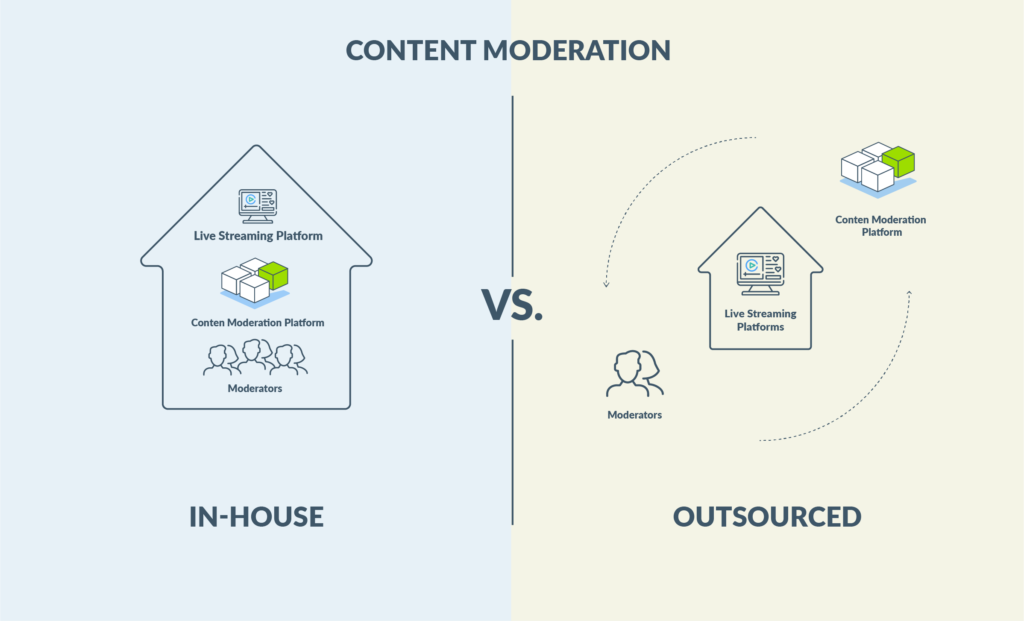
How Imagga Can Help You Ace Your Content Moderation
Whether you opt-in for in-house or outsourcing, Imagga is your trusted content moderation partner. We offer a complete AI-powered content moderation solution that employs the best from artificial and human intelligence.
Our automatic platform uses advanced Artificial Intelligence algorithms to provide precise filtering of unsafe content, saving tons of work hours that otherwise moderators have to spend in reviewing.
The automated content screening is self-learning, so it gets better the more you use it. Plus, you can fully control the settings of the moderation process: you can select and set up different projects, batch sizes, priority levels, privacy issues, and assigned moderators, to mention a few.
With Imagga’s content moderation platform, you have full freedom to choose whether you work with your in-house moderation team — or an outsourced one. You can easily plug in your in-house moderators in our AI platform, or hire external help from us that’s going to seamlessly enhance the automatic platform.
Ready to get started? Contact us for a demo of our AI-powered moderation solution or to learn more about Imagga’s content moderation services.
Unsafe Content Is Bad for Business. Here’s How to Get Rid of It
The ubiquitous creation of different types of content — from text and audio to images, video, and live streaming — is driving the development of online platforms across locations and industries.
This makes content moderation a top priority for a wide variety of online businesses, including marketplaces with user-generated content, dating websites, online communication platforms, and gaming websites, among many others.
As Trust and Safety programs are steadily becoming the basis of building a safe digital environment, you just can’t skip on adequate content screening if you want to grow a successful online business.
Detecting problematic content is important for a variety of reasons: protecting the users, meeting national and international digital safety regulations, and building up your reputation as a safe online platform.
Here’s why you should take care of content moderation skillfully — and how you can go about doing that with ease.
Why Bad Content Is Bad for Business
The unimaginable amounts of content created online every day is both a blessing and a curse for online businesses.
Platforms want to give space to their users to express themselves — yet this comes at the price of having to monitor tons of user-generated content and removing the ‘digital garbage’. The content that has to be flagged and removed for safety reasons includes illegal, obscene, insulting, and inappropriate materials, as well as any other content that doesn’t meet the platform’s guidelines.
If left unsupervised, problematic content can get out of control and jeopardize the very existence of a platform.
It’s Harmful to Your Users
Unsafe content is a direct threat for the very people you want to have on your website, whether you’re running a travel platform, a marketplace, or a dating platform.
As the owner of the platform, you have a moral responsibility towards users to ensure a safe and secure environment. It’s especially important to protect vulnerable groups and to prevent discrimination, insults, and threats as much as possible.
With content moderation, you can prevent bullies, trolls, and other people with harmful intentions to reach the rest of your user base and taking advantage of them and of your brand.
It’s an Issue with Legal Compliance
Beyond the ethical duties, your online business may be liable for the content you publish. There are various national and international regulations regarding safe content that you may need to comply with to stay in business. While previously social media platforms, for example, were exempt from liability for illegal content, this is changing.
The UK is moving towards such regulations, having its communications regulator screen for illegal content and fine platforms that expose their users to this. Similar steps have been taken in France, Germany, U.S., Brazil, and many other countries.
While there is a pushback to content moderation legislation because of censorship considerations, such regulations are steadily gaining ground, including the EU’s Digital Services Act.
It’s a Challenge to Your Brand Reputation
Last but not least, leaving harmful content published by ill-willing users on your platform is a risk for your brand reputation.
If your regular users get exposed to violence, propaganda, child nudity, weapons, drugs, hate symbols, and a long list of other unsafe content, they’re very likely to stop using your services.
The word of mouth about the permissibility of a platform towards problematic content spreads around fast — especially in a world as digitally connected as ours. This makes it difficult to protect your reputation if you have allowed unsafe content to circulate freely. You may also face legal problems if the case is brought to the attention of state and international authorities.
The Key to Successful Content Moderation: Imagga
Content moderation is undoubtedly crucial for online platforms — but it’s no easy feat. The last years have seen the gradual move from manual moderation done by people to automatized moderation provided by technology.
Imagga offers a fully or semi-automatic content moderation solution, powered by our extensive experience and achievements in Artificial Intelligence. Our real-time content screening works at scale and ensures that any Trust and Safety program to protect your users and reputation is successful.
With the automatic filtering of unsafe images, video, and live stream, your moderation teams can breathe in relief — as their work is significantly reduced and they’re protected from the sheer amount of harmful content they need to process. You can use different scopes of content moderation which you can deploy in the way that works for you, whether it’s cloud, on-premise, or edge deployment. And the best part: the self-learning AI gets better over time!
Interested to give it a try? Get in touch today to learn how you can ace your content moderation with the help of Imagga.
Automatic Image Tagging for Lightroom Is Here: Meet Wordroom
Whether you’re using Lightroom to organize and edit your private photos or to process your customer’s images, keeping your visual collection under control can be a nightmare. All of us want to have well-organized photo albums, yet finding the time for tedious sorting is not on top of our wishlist.
One of the proven ways to put order in the piles of images is to add metadata to each of them, so that their content is identifiable. By assigning keywords that describe the most important elements - people, objects, places, colors, and themes, you can create a searchable visual database. Then finding the right picture is done in a matter of seconds, whether it’s the favorite family photo or a specific stock image that you need for a client.
While keyword tagging in Lightroom is undoubtedly useful, handling it manually is a never-ending battle. It’s time-consuming and boring, yet there’s barely any other way to go about organizing your visuals.
That’s where Imagga’s Wordroom comes in - a simple yet powerful image tagging Lightroom keyword plugin that revolutionizes the way you organize your image collection. Backed by machine learning algorithms, the tool ‘sees’ the image and automatically offers diverse keywords with high accuracy. You then add them to the image’s metadata with a single click.

Let’s dig in the process of keyword tagging in Lightroom and explore how Wordroom can make your work with visuals easier.
The need for keyword tagging in Adobe Lightroom
Organizing a large photo collection is a tough nut to crack. For hobbyist and professional photographers alike, the need to have a system for sorting manifests almost immediately - in the first moment when the images start to pile up on the hard drive.
The most common way to solve this is to introduce keywords for each photo. They describe the major elements and themes in the image, providing it with a content description, as well as a contextual one. You have to enter the relevant words when organizing your collection, so later on, you can search for a specific image or for a certain topic.
The manual approach to keyword tagging is infamously hard and has produced an endless amount of jokes and complaints among visual professionals. It entails spending long hours in reviewing each image. You need to note the words that best describe the people, animals, objects, as well as colors, themes and emotions that can be seen on every photo. It’s not only about mentioning the objects and activities on it, but also considering its deeper meanings and context.
Despite the efforts, the manual keyword system often proves inconsistent and difficult to scale. The process is doable for a few images, but when you have to sort hundreds of them, it becomes a serious burden. While copy-paste works for a while, most of us would agree that there are much better ways to spend one’s time. Here’s how AI image recognition helps.
Wordroom: the power of automatic tagging

Computer vision technology is a powerful asset in numerous industries today, but its application is ever more important in digital photography and videography. Ploughing through hundreds of thousands of images and videos is a central issue for photographers, videographers and stock website contributors, as well as for photo hobbyists. For all of them, keyword tagging is the much hated item on the to-do list that always gets postponed or done halfway.
With a simple plugin, the process of keyword tagging in Lightroom becomes a breeze. Wordroom uses image recognition based on artificial intelligence in order to identify the main elements and attributes of each visual. They include objects, colors, shapes, and even actions, emotions, timeframes, and abstract terms. Once the plugin ‘reads’ the information, it automatically provides you with a list of keywords that you can edit and add to. You can use its capabilities for both small and large collections alike.
The additional benefit of using an AI-powered tool like Wordroom is that it gets better with time. The more people use it to auto-tag photos, the more data the plugin can use to improve its accuracy. That’s at the core of machine learning, which means the AI develops with every new completed task.
Image auto tagging for Lightroom is just one of the many uses of Imagga’s Auto Tagging API. Its image recognition capabilities bring innovation and easier processes for diverse types of professionals and businesses - real estate, cloud and other technologies, media, and commerce and retail, among others. The API is accurate and efficient, while allowing you to handle massive database of images with its customizable tagging. Computer vision also powers image and facial recognition, which are heavily used by social media nowadays.
How to use Wordroom
It’s easy to get started with image auto tagging for Lightroom. The installation of Wordroom is a seamless process.
In Lightroom, you have to select Plugin Manager from the dropdown menu File. Then you have to add the plugin Wordroom from the folder on your computer and enable it. Click Done and you’re ready to go. Check out the video below for the full details.
The next step is to try out the tool. From the dropdown menu Library, select Plug-in Extras > Auto-keyword. You will then see the window of the plugin. It will display the automatic keyword suggestions for the currently selected photo. The plugin supports both RAW and non-RAW image formats.
Wordroom offers up to 30 keywords for each image. You can deselect the ones that you find irrelevant. You can also add an unlimited number of extra keywords manually, if needed. When you click the button “Add to keyword tags,” Wordroom will display the selected automatic and the manually added keywords in Lightroom’s Keyword tags panel.
Once a photo has been tagged, you will be able to see the keywords in the metadata panel. You can copy them and paste them for other images, if they are similar. You can also edit manually the keywords in the panel as well. Each photo that already has keywords is displayed with a tag icon on its thumbnail.
For up to 100 photos, you can use the plugin without registration. To continue using Wordroom, you need to sign up for a free plan. It allows you to auto-tag up to 2,000 photos per month. Professional photographers would need a larger bandwidth. If that’s your case, you can use the next plan, which includes automatic keyword tagging of up to 12,000 photos per month for $14.
In order to analyze your photos, Wordroom transfers them to the cloud. This means that you need a working internet connection while using it. However, your photos’ safety is guaranteed, as they are not stored locally for the image recognition process.
If you want to contribute to the plugin’s improvement, you can click the option Agree to allow the tool to use your visual data. That’s how it can improve its image recognition technology.
Want to try image auto tagging in Lightroom?
The simple premise of Wordroom is to help you handle your photo collections easily and with less effort. The AI-powered technology behind the plugin speeds up the keyword tagging process, freeing up your time, so you can focus on what’s truly important in your work.
Keen on checking out the automatic keyword functionality of Wordroom for your Lightroom photo collection? You can get started for free today. Just enter your email, and you’ll receive the download link.
How to Handle Content Moderation with the Human Factor in Mind
User-generated content (UCG) is at the heart of the online world we live in, dramatically shaping how we humans exchange information. While it brings unseen freedom in terms of communication channels and forms of expression, as we well know, there is a dark side to every revolution. Scamming, plagiarism, cyber bullying, not safe for work content (NSFW) and outright scary stuff - they’re all out there in the pictures, videos, articles and audio clips being freely posted online.
For years, brands have been trying to figure out effective ways to sort out disturbing and harmful user-generated and curated content. Content moderation is seen as the only way to ensure a safe online environment for digital users and prevent abuse and harmful practices online.
For businesses, efficient moderation is the answer to the ever-growing risks that they face if they don’t eliminate illegal and abusive content: harm to the brand’s reputation, legality and compliance issues, and financial consequences. Moderation is the only solution for excluding content that contains violence, extremism, child abuse, hate speech, graphic visuals, nudity and sex, cruelty, and spam.
Yet the price to pay is high, typically involving endless hours of traumatic work for low-paid employees. In the beginning of November 2019, the top content moderation company Cognizant, serving giants like Facebook and Google, declared it’s leaving the business. The shocking news came amid scandals revolving around its working conditions and the harmful psychological effects that content moderation jobs have on people.
While still developing its capabilities, AI-powered moderation is of enormous help in solving many of the issues with illegal and abusive content. Computer vision alleviates a large part of the burden on human content moderators, while increasing productivity and optimizing the moderation process for businesses.
What’s the solution to the harsh reality of content moderation? Let’s dig in and explore the options.
The risks of human content moderation
The job of the online content moderator is in high demand: more than 100,000 people around the world are involved in content review for online companies. Many of them are based in the Silicon Valley, but a significant proportion of the work is also outsourced - such as in the Philippines and Mexico.
A recent New Yorker interview with Sarah T. Roberts, author of Behind the Screen book about content moderation workers, reveals the ‘underworld’ of this job. Employees have to go through thousands of visuals per day, typically reported by end users as inappropriate, illegal or disturbing. It would be then up to the moderators to decide, in a matter of seconds, whether the image contradicts the company’s and country’s policies, or not. This means moderators have to make super-quick decisions about the appropriateness of a piece of content, while considering business guidelines and ethical codes.
According to the interviews that Roberts conducted with moderators around the world, the emotional toll is enormous. Burnout and desensitization are only the surface, followed by PTSD, social isolation and depression. On top of the negative psychological effects, Roberts’ research shows that content moderators typically receive entry-level salaries and have to agree with subpar working conditions. Tech companies, as well as content moderation service providers, consider this type of work as rather ‘mechanical,’ ignoring its heavy effects.

Besides the ethical and psychological considerations, content moderation done by humans is slow and cannot be easily scaled. With millions of visuals posted daily, online companies are facing waterfalls of content that needs to be reviewed for legal and ethical reasons. So what’s on the table today, coming from Artificial Intelligence applied to content moderation?
What AI has to offer in content review
Image recognition is revolutionizing the online world in countless ways. Its most ‘humane’ and ethical benefit, though, may as well be its contribution to automatizing image moderation. Computer vision allows the rapid analysis and identification of visual content, saving hours of work that would otherwise be performed manually by people.
How does it function? When an image is submitted for AI review, it is first analyzed by the API, which is the pre-moderation stage. Then the algorithm makes its conclusion regarding what the picture represents, which is done with near-perfect accuracy. On the basis of this keyword categorization, the computer models identify if any objects on the image match its list of inappropriate content.
For images screened by the AI that it deems safe, it’s possible for businesses to set automatic posting, as well as automatic categorization of the content. In case the algorithm detects potentially problematic content (the grey zone), the visuals are referred for human screening. While manual review is still necessary, the toughest part of the work - the identification of objects on the monstrous volume of visuals - is completed by the AI. The content moderation software also offers automatic filtering. If a piece of content is considered by the algorithm as too offensive, it’s not redirected for moderation, but directly removed.
In addition to reviewing potentially harmful and disturbing content, AI-powered content moderation can bring extra benefits to businesses. For example, it helps with reducing clutter in websites where users post sales listings. Computer vision allows the filtering of offers, so that buyers are not swamped with irrelevant, as well as inappropriate or disturbing listings. This has immediate and important benefits for online marketplaces and e-commerce.
Image recognition can also be used to ensure quality by removing low-resolution visuals, as well as identifying unwanted watermarks or symbols and preventing copyright infringements. This is especially useful for social media, stock websites, and also for retailers. Last but not least, AI content moderation can contribute to fighting disinformation and the spreading of fake news.
Blending AI and human power
Numerous cases in the last decade illustrate that relying solely on human moderation is expensive and difficult to scale, in addition to being a hazard to people conducting the job. At the same time, AI algorithms cannot fully take over content moderation - yet. In most cases today, the best approach is using both - in the most practical and safe ways.
Combining the power of human judgment and computer vision holds enormous potential for handling the tons of violent, pornographic, illegal and inappropriate visuals that are being posted online daily. This approach allows a significant workload reduction for hundreds of thousands of psychologically harming content moderator positions. It is also cost-effective for companies, as a large part of the content is processed by AI.
At the same time, the participation of expert moderators who would contribute to the improving of the algorithms and setting the overall content moderation guidelines of a business is crucial. AI is developing quickly and presenting great options for content moderation, allowing for high levels of accuracy and scaling. However, the human input remains decisive, as only people are able to provide full understanding of context and cultural relevance, as well as emotional processing.
Imagga’s content moderation platform is designed to work in sync with human moderators. They get notified for pre-defined scenarios that require human judgement for the AI-flagged content in images, videos and live streaming. Moderators can manually set threshold ranges regarding when human review is necessary - for different types of moderation issues, such as NSFW, violence, weapons, and more. Companies can choose to include their own moderation teams in the process, or to hire a moderation team from Imagga.
With the use of powerful AI for image moderation, human labor is minimized dramatically. This helps companies optimize their content moderation processes. The results are higher efficiency and improved quality, as well as easier scaling of moderation efforts, which is key for UGC-based businesses today.
Get started with AI-powered content moderation
Companies operating with large-scale user-generated and curated content require moderation in order to protect their customers from harmful and abusive content, as well as to protect themselves from legal, economic and reputational damage. The approach depends on each business’s choice - the right mixture between the impressive capabilities of AI and the still required human input. Yet the benefits of image moderation through computer vision are indisputable.
Explore how Imagga’s content moderation platform can help your business handle content review safely and efficiently.
7 Image Recognition Applications of the Future
Did you know that image recognition is one of the main technologies that skyrockets the development of self-driving cars?
Image identification powered by innovative machine learning has already been embedded in a number of fields with impressive success. It is used for automated image organization of large databases and visual websites, as well as facial recognition on social networks such as Facebook. Image recognition makes image classification for stock websites easier, and even fuels marketers’ creativity by enabling them to craft interactive brand campaigns.
Beyond the common uses of image recognition we have gotten accustomed to, the revolutionizing technology goes far beyond our imagination. Here are seven daring applications of computer vision that might as well belong in a science fiction novel - but are getting very close to reality today.
#1. Creating city guides
Can you imagine choosing your next travel destination on the basis of real-time location information from Instagram photos that other tourists have posted? Well, it’s already out there. Jetpac created its virtual “city guides” back in 2013 by using shared visuals from Instagram.
By employing image recognition, Jetpac caught visual cues in the photos and analyzed them to offer live data to its users. For example, on the basis of images, the app could tell you whether a cafe in Berlin is frequented by hipsters, or it’s a wild country bar. This way, users receive local customized recommendations at-a-glance.
In August 2014, Jetpac was acquired by Google, joining the company’s Knowledge team. Its knowhow is said to be helping Google’s development of visual search and Google Glass, the ‘ubiquitous computer’ trial of the tech giant.
#2. Powering self-driving cars
In the last years, self-driving cars are the buzz in the auto industry and the tech alike. Autonomous vehicles are already being actively tested on U.S. roads as we speak. Forty-four companies are currently working on different versions of self-driving vehicles. Computer vision is one of the main technologies that makes these advancements possible, and is fueling their rapid development and enhanced safety features.
To enable autonomous driving, artificial intelligence is being taught to recognize various objects on roads. They include pathways, moving objects, vehicles, and people. Image recognition technology can also predict speed, location and behavior of other objects in motion. AI companies such as AImotive are also instructing their software to adapt to different driving styles and conditions. Researchers are close to creating AI for self-driving cars that can even see in the dark.
https://www.youtube.com/watch?v=sIlCR4eG8_o
#3. Boosting augmented reality applications and gaming
Augmented reality experiments have long tantalized people’s imagination. With image recognition, transposition of digital information on top of what we see in the world is no longer a futuristic dream. Unlike virtual reality, augmented reality does not replace our environment with a digital one. It simply adds some great perks to it.

You can see the most common applications of augmented reality in gaming. A number of new games use image recognition to complement their products with an extra flair that makes the gaming experience more immediate and ‘real.’ With neural networks training, developers can also create more realistic game environments and characters.
Image recognition has also been used in powering other augmented reality applications, such as crowd behavior monitoring by CrowdOptic and augmented reality advertising by Blippar.
#4. Organizing one’s visual memory
Here’s for a very practical image recognition application - making mental notes through visuals. Who wouldn’t like to get this extra skill?
The app Deja Vu, for example, helps users organize their visual memory. When you take a photo, its computer vision technology matches the visual with background information about the objects on it. This means you can instantly get data about books, DVDs, and wine bottles just by taking a photo of their covers or labels. Once in your database, you can search through your photos on the basis of location and keywords.
#5. Teaching machines to see
Besides the impressive number of image recognition applications in the consumer oriented market, it is already employed in important manufacturing and industrial processes. Teaching machines to recognize visuals, analyze them, and take decisions on the basis of the visual input holds stunning potential for production across the globe.
Image recognition can make possible the creation of machines that automatically detect defects in manufacturing pipelines. Besides already known faults, the AI-powered systems could also recognize previously unknown defects because of their ability to learn.
There is a myriad of potential uses of teaching machines to perceive our visual world. For example, Xerox scientists are applying deep learning techniques to enable their AI software mimic the attention patterns of the human brain when seeing a photo or a video.
#6. Empowering educators and students
Another inspiring application of image recognition that is already being put in practice is tightly connected with education again - but this time, with improving education of people.
Image recognition is embedded in technologies that enable students with learning disabilities receive the education they need - in a form they can perceive. Apps powered by computer vision offer text-to-speech options, which allow students with impaired vision or dyslexia to ‘read’ the content.
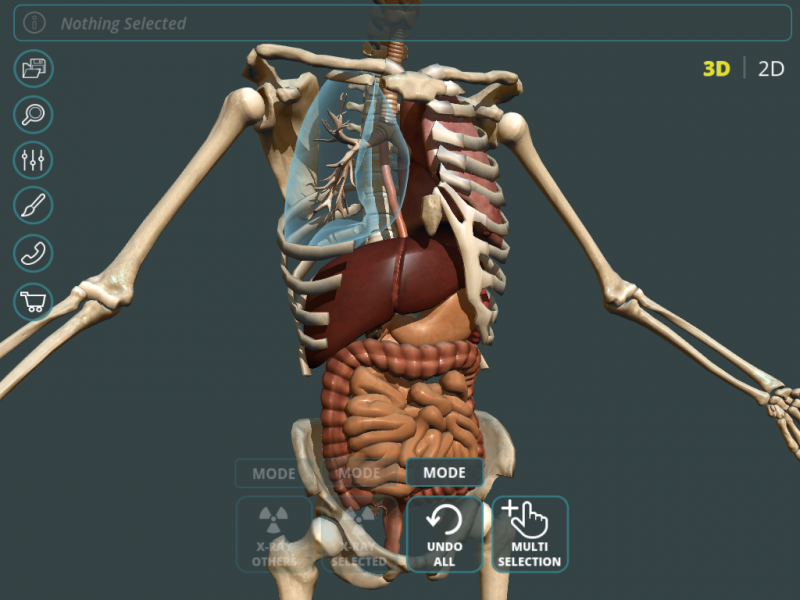
Applications of image recognition in education are not limited to special students’ needs. The technology is used in a range of tools that push the boundaries of traditional teaching. For example, the app Anatomy3D allows discovery of the interconnectedness between organs and muscles in the human body through scanning of a body part. It revolutionizes the way students can explore anatomy and learn about the way our bodies function. Image recognition uses can also help educators find innovative ways to reach ever more distracted students, who are not susceptible to current methods of teaching.
#7. Improving iris recognition
Iris recognition is a widely used method for biometric identification. It’s most common application is in border security checks, where a person’s identity is verified by scanning their iris. The identification is conducted by analyzing the unique patterns in the colored part of the eye.
Even though iris recognition has been around for a while, in some cases it is not as precise as it’s expected to be. The advancement of image recognition, however, is bringing new possibilities for iris recognition use across industries with improved accuracy and new applications. Most notably, iris identification is already being used in some consumer devices. The smartphones Samsung Galaxy Note7 and Galaxy S8, and Windows Lumia 950 are among the ones already equipped with such a capability.
While recognition is becoming more precise, security concerns over biometrics identification remain, as recently hackers broke the iris recognition of Samsung Galaxy S8. Together with the advancement of computer vision, security measures are also bound to improve to match the new technological opportunities.
Have you had an experience with AI technology from a movie that years later you seen in real life? Share with the rest of the group and if it enough people like it we can build it together.
The uses of image recognition of the future are practically limitless - they’re only bound by human imagination. What is the practical application of computer vision that you find the most exciting or useful? We’d love to read about it in the comments below.
The Top 5 Uses of Image Recognition
Not long ago, artificial intelligence sounded like a science fiction prophecy of a tech future. Today machine learning has become a driving force behind technological advancements used by people on a daily basis. Image recognition is one of the most accessible applications of it, and it’s fueling a visual revolution online.
Мachine learning embedded in consumer websites and applications is changing the way visual data is organized and processed. Visual recognition offers exciting opportunities similar to the ones in science fiction movies that made our imagination run wild.
Image recognition has grown so effective because it uses deep learning. This is a machine learning method designed to resemble the way a human brain functions. That’s how computers are taught to recognize visual elements within an image. By noticing emerging patterns and relying on large databases, machines can make sense of images and formulate relevant categories and tags.
From image organization and classification to facial recognition, here are here are six (updated since the initial publication of the blog post) of the top applications of image recognition in the current consumer landscape.
#1. Automated Image Organization - from Cloud Apps to Telecoms

One of the most popular applications of image recognition that we encounter daily is personal photo organization. Who wouldn’t like to better handle a large library of photo memories according to visual topics, from specific objects to broad landscapes?
Image recognition is empowering the user experience of photo organization apps. Besides offering a photo storage, apps want to go a step further by giving people better search and discovery functions. They can do that with the automated image organization capabilities provided by machine learning. The image recognition API integrated in the apps categorizes images on the basis of identified patterns and groups them thematically.
Take Eden Photos, a Mac app for photo organization, as an example. It uses Imagga’s image recognition to offer its users image tags, automatic keywording of photos, and auto-categorization on the basis of visual topics. Users can sync their photos’ metadata on all devices and get keyword search in the native Photos app on their iPhones too.
Telecoms are another set of companies that integrate image recognition to improve their users’ experience. They add value to their services by offering image organization and classification for photo libraries, which helps them attract and retain their customers. On the customer side, user experience is improved by allowing people to categorize and order their photo memories.
An illustration of this application is Imagga’s solution for Swisscom. The Swiss telecom needed an efficient and secure way to organize users’ photos for its myCloud online service. With Imagga’s image recognition API installed on premise, Swisscom now offers its customers a safe feature that organizes and categorizes their visual data.
#2. Stock Photography and Video Websites

A powerful commercial use of image recognition can be seen in the field of stock photography and video. Stock websites provide platforms where photographers and videomakers can sell their content. Contributors need a way to tag large amounts of visual material, which is time-consuming and tedious. In the same time, without proper keyword attribution, their content cannot be indexed - and thus cannot be discovered by buyers.
Image recognition is thus crucial for stock websites. It’s fueling billions of searches daily in stock websites. It provides the tools to make visual content discoverable by users via search. In the same time, image recognition is a huge relief for stock contributors. They get automatic keyword suggestions, which save them a ton of time and efforts. Image recognition can also give them creative ideas how to tag their content more successfully and comprehensively.
Keywording software tools like Qhero have integrated with Imagga’s image recognition AI to help stock contributors describe and tag their content with ease. Such tools analyze visual assets and propose relevant keywords. This reduces the time needed by photographers for processing of visual material. It makes manual keywording a thing of the past by suggesting the most appropriate words that describe an image.
#3. Visual Search for Improved Product Discoverability

Visual Search allows users to search for similar images or products using a reference image they took with their camera or downloaded from internet.
Imagga Visual Search API enables companies to implement image-based search into their software systems and applications to maximize the searchable potential of their visual data. The fashion, home décor and furniture online retailers are already integrating it in their digital shopping experience to increase conversions and decreases shopping cart abandonment while also offering rich media experience to users.
Meanwhile consumers are increasingly adopting this new search habit and Gartner predicts 30% increase in digital commerce revenue by 2021 for companies who redesign their websites and apps to support visual and voice search. The benefits of Visual Search include enhanced product discovery, delivery where text searches fail and easy product recommendation based on actual similarity. Learn more about the use case of Visual Search in e-commerce and retail.
#4. Image Classification for Websites with Large Visual Databases
A range of different businesses possess huge databases with visuals which is difficult to manage and make use of. Since they may not have an effective method to make sense of all the visual data, it might end up uncategorized and useless.
If a visual database does not contain metadata about the images, categorizing it is a huge hassle. Classification of images through machine learning is a key solution for this. With image recognition, companies can easily organize and categorize their database because it allows for automatic classification of images in large quantities. This helps them monetize their visual content without investing countless hours for manual sorting and tagging.
The best part about automated image classification is that it allows for custom training on top of the general image recognition API. This means that businesses can provide custom categories, which the AI is trained to recognize and use. Our case study on Tavisca is a good example of using custom classifiers in practice and automating the process of hotel photos categorization.
#5. Image and Face Recognition on Social Networks

Visual recognition on social media is already a fact. Facebook released its facial recognition app Moments, and has been using facial recognition for tagging people on users’ photos for a while.
While face recognition remains a sensitive ground, Facebook hasn’t shied away from integrating it in users’ experience on the social media. Whenever users upload a photo, Facebook is able to recognize objects and scenes in it before people enter a description. The computer vision can distinguish objects, facial expressions, food, natural landscapes and sports, among others. Besides tagging of people on photos, image recognition is used to translate visual content for blind users and to identify inappropriate or offensive images.
Image recognition is applied in other ways on social networks too. For example, the SmartHash iOs app employs Imagga’s API to offer its users an easy tool for automatically creating hashtags for their photos. This allows people to successfully share their images online without the need to research and brainstorm hashtags.
Photo recognition has also been embraced by other image-centric services online. Google Photos and Apple’s Photos app cluster photos on the basis of events and places, plus offer face detection. The application of image recognition significantly enhances users’ experience. It helps them organize their photos in meaningful series. They can easily exchange, say, travel photos with friends who were a part of the same trip.
#6. Interactive Marketing and Creative Campaigns
The applications of image recognition are not limited to consumer services only. Advertising and marketing agencies are already exploring its potential for creative and interactive campaigns. It opens new opportunities for learning more about target audiences and serving them with impressive branded content.
Social intelligence today is largely based on social listening. It involves following conversations on social media to learn more about prospects. But today, this knowledge can be gathered from visuals shared online with much higher efficiency. In a sea of abundant and often irrelevant visual content, extracting useful information is possible only through machine learning - or ‘visual listening.’ For example, image recognition can identify visual brand mentions and expression of emotion towards a brand, as well as logo and other brand data that would be otherwise undiscoverable. On the basis of collected information from analyzing images, marketers can better target their campaigns by using customization and personalization.
Besides valuable information about potential customers, image recognition can be used for crafting creative content that engages people and helps build their relationships with brands. To illustrate this: Imagga’s image recognition API was used in a KIA marketing project to create an interactive campaign. By profiling of participants’ image content online, each person is assigned to a different lifestyle group. Then they are matched to the right car that best fits their style among the 36 different car styles offered by KIA.
Celebrating the Power of Image Recognition
Image recognition holds potential for a wide array of uses and industries, so these five examples are certainly not all-encompassing. They do illustrate, though, the diversity of applications that machine learning can offer to businesses that work with large libraries of visual content.
What is your business experience with image recognition?
Editor’s Note: This blog was originally published on March 23, 2017 and updated on May 21, 2019 for accuracy and comprehensiveness.
4 Image Recognition Uses By Facebook That Can Improve Digital Asset Management
Using image recognition to identify friends and locations is a common feature on Facebook but this post is not about those simple capabilities of computer vision. We are going in-depth about image recognition and what social networks can do with image recognition.
Besides photo tagging and categorization, Facebook is employing image recognition for a number of other important purposes. The most notable ones include scanning for inappropriate content in its network and enabling visually impaired users to get image descriptions of shared content. Image recognition is also likely to fuel better visual search on the social media.

Facebook’s adoption of image recognition is helping lead the way for a full-fledged revolution of how visual content is handled online. While it’s not the only company that’s developing an image recognition technology, the top social media is used by billions of people around the world daily. This makes it able to set trends and push innovations that other players might not be able to. Facebook has also made a move to open sourcing its image recognition AI, which may turn out to be a game changer in the field.
How Facebook has been using image recognition
Improving user experience with photo tagging and search
The most well-known application of image recognition is the photo tagging feature that Facebook offers since 2010. It’s based on facial recognition that enables automatic suggestions for tagging people on photos. Image recognition also can identify the location of where photos were taken. It’s the technology that powers the ‘Memories’ feature in users’ newsfeed too. While it’s been a huge boost in user experience, the feature has also turned controversial in terms of privacy and even led to lawsuits against Facebook.

In the last months, Facebook announced that it has ramped up its image recognition API. Its image recognition engine called Lumos will power a new way for users to search through their uploaded photos. Instead of looking for an image based on the date, location and tags, they would be able to find a photo by entering a keyword signifying what’s on it.
If you’re curious to know what Facebook can ‘see’ in your photos, you can check out the Chrome extension that displays the automated image tags it has generated.
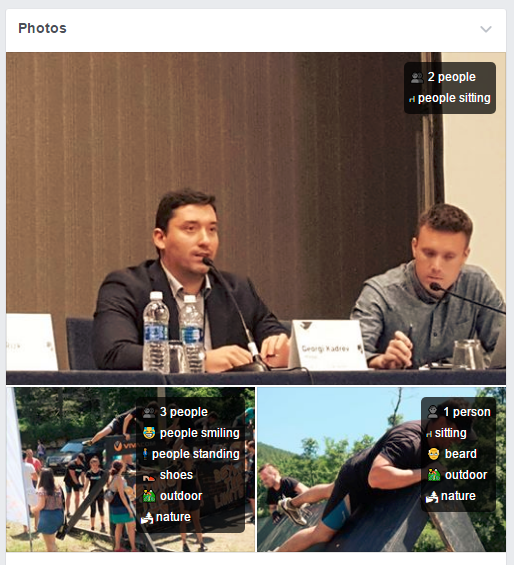
Image reader for the visually impaired
Facebook uses image recognition to fuel another important feature in its toolset. It’s the ‘automatic alternate text’ that identifies images to visually impaired users. The image recognition AI generates descriptions of what’s on a photo. In this way, it provides an alternative way for blind users to perceive the content of images. Twitter introduced such a feature in March 2016, and Facebook followed in April 2016.
With the improvements of its image recognition AI in February 2017, Facebook now provides visually impaired people with even better descriptions of photos. Initially, they could get basic information about the main figures on an image. Now the engine can describe what action is taking place in the photo.
Content moderation in action
Learn to smart crop and use it in as thumbnail saving you up to 30% posting time..
Image recognition is used by Facebook to scan for abusive, hateful and obscene content on the social media. It is steadily replacing the need for manual monitoring.
Imagga has developed its own NSFW classifier and offers content moderation solutions that can be used by any company that needs to keep tabs on large amounts of visual content.

Why Facebook’s image recognition breakthroughs matters
While Facebook uses of image recognition can be fascinating, they would not have been so important if the company was not the major player on the tech market that it is today. The significance of its machine learning for visual recognition go far beyond its immediate applications.
Facebook is irrevocably making image recognition mainstream. Other tools and applications are steadily following the example and embedding image recognition in their products and services. This trend holds potential to transform many business venues - from creative agencies and marketing companies to e-commerce businesses. Special applications like Aipoly are even pushing the boundaries and providing a way for blind people to ‘see’ the world around them.
In the marketing field, the popularity of image recognition can fuel enormous amounts of research about online users and overall trends. Advertisers have already realized the huge potential of Facebook’s image recognition capability. Data collected from visual analysis of shared content can inform better-targeted campaigns.
Facebook’s technology is popularizing image recognition, but it’s far from being the only player in the field. Imagga’s API powers the image recognition needs of businesses that do not want to share data with big players like Facebook and Google through its on-premise offering.
What uses of image recognition do you think will change the web and how? Share in the comments section and let’s have a talk.

Image Recognition Is Changing Interactive Marketing
As a creative marketer, you’re likely on the lookout for innovative ways to reach your audience at all times. There’s a new kid on the block that just might revolutionize interactive marketing, and it’s called image recognition.
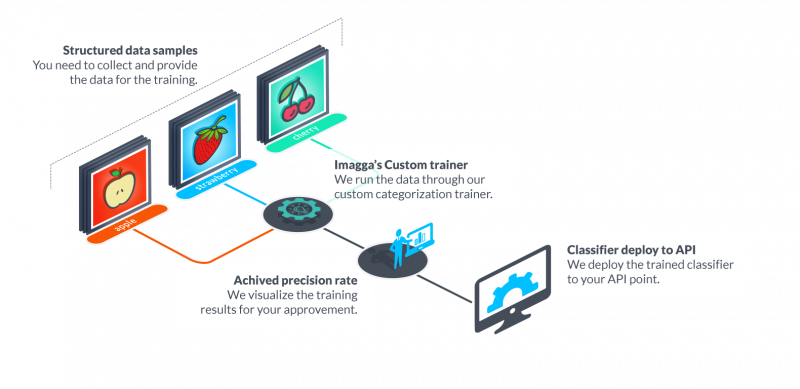
While visual recognition enabled by machine learning has been around for awhile, its potential to boost marketers’ efforts is being discovered only lately. Unlike text, which is easily searchable, visual information online has remained a ‘black box.’ But consumers today share an enormous amount of visual data, which marketers struggle to understand.
How can image recognition help you as an interactive marketer?
Image recognition can help brands make sense of the data contained in the ‘visual web.’ Visual listening through machine learning arms marketers with a powerful tool that they’re seeking relentlessly: relevance of content for their audiences.
Because of the technical capabilities it presents, computer recognition of images allows for creative forms of visual storytelling across media too. This offers powerful methods for engaging people and immersing them in new types of interaction with brands. Through effortless profiling based on the social visual content people share online rather than extensive questionnaires, image recognition opens new doors for personalization.

Here are three top ways in which image recognition is bringing unseen advancements for interactive marketing - and how your creative campaigns can hop on the new tech wave.
Visual listening is on the rise for brands
Until recently, a textual understanding of social media and the content shared there by users was the status quo. But with billions of images created and distributed online daily, brands now realize that social listening focusing on text only is ineffective and simply outdated. The rise of visual social networks like Pinterest, Instagram, Snapchat and Tumblr, as well as the wide use of visuals on Facebook, Twitter and LinkedIn, further pushes this understanding.
Marketers need to analyze enormous quantities of visual material to grasp how people use the currency of ‘visual’ online. While some of them have tried to make sense of images via metadata, this still has not shed enough light on the vast spaces of the visual web.

Enter visual listening. This new method for understanding photos and graphics online is enabled by image recognition AI. It enables brands to mine visual content that their audiences are sharing and engaging with. In this way, they can identify patterns, analyze trends and gain valuable business insights. Marketers can use this data to track how visual posts spread online, what type of visuals gain the most attention, and who is engaging with their visual content. And that’s only the tip of the iceberg.
Simply put, visual listening allows marketers to understand how people consume and create visuals in relation to brands. It provides them with a way to read consumers’ emotions and reactions from the visual data they share. This is also a tool for them to discover and benefit from user generated content that promotes the brand and to identify influencers that can be instrumental in their marketing efforts.
For brand protection, image recognition is a handy tool for monitoring how copyrighted visual material is handled online. Brands can also gain insights into their competitors’ visual presence, which can inform their own campaigns.
With image recognition, personalization can flourish
The applications of image recognition for marketing is not limited to visual listening. In fact, it can fuel powerful personalization, so brands can better reach and engage their audiences.
Creative marketing campaigns based on image recognition analysis can be highly targeted and thus can make a real impact. Through gathering insights from visuals, marketers can learn more about the preferences of different target groups. Based on this, they can craft content that engages people better because it’s relevant and personalized. `Instead of using tedious questionnaires that people avoid, it allows brands to learn more about people’s preferences without asking questions. This is done by analyzing the visual content that users have shared online. It empowers brands to tell engaging stories at the right points of contact with people. KIA Motors created an interactive campaign for 36 lifestyles to match its new KIA K5 (Optima) .
How is image recognition used in the financial industry
The Commonwealth Bank of Australia equipped its mobile app with image recognition software that allows people looking for a new house to take a photo of their dreamed home. By analyzing the picture, the app provides them with information on prices, taxes and other details. Furthermore, the app analyzes their personal financial data to inform them of mortgage options for purchasing the house.
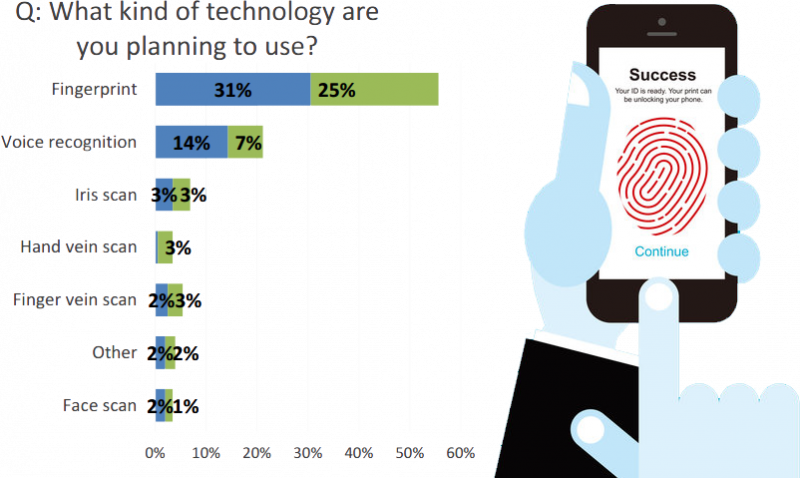
How image recognition created interactive in-store campaigns
Image recognition has a place in the direct shopping experience of consumers by fueling contextual marketing and template matching. Some stores and shopping apps have already integrated image recognition capabilities. People can take a photo of an item they’d like to purchase. Then they receive information about it, locations where they can get it, or even a mobile-optimized page to order it directly.
Big brands like Macy’s and Neiman Marcus have embedded image recognition in dedicated apps. Customers take photos of clothes and accessories they like, and the app automatically suggests items from the brands’ inventory. Other online and brick-and-mortar retailers have also adopted image recognition to engage customers and make their shopping seamless.

A well-known example of image recognition in a consumer app is Vivino. People snap a photo of a wine label to get ratings and details about the brand and sort. The app has turned into a popular helper for making an informed wine choice.
How is image recognition used for access control
Another cool example of image recognition for an experimental creative campaign is Imagga’s Hipster Bar hack. During the WdW Festival in 2015, the Rotterdam-based artist Max Dovey hosted an installation called the Hipster Bar. Using Imagga’s image recognition, the camera at the door of the bar would take a photo of the person who wants to enter. Then it would juxtapose it against a database of photos of hipsters. If the person matches the style, they’d be able to enter the bar. The concept used for this art case can be applied in a number of marketing purposes. It is based on custom training of the AI by providing it with relevant visual data.
As these three prominent applications of image recognition illustrate, it holds impressive potential for a number of interactive marketing initiatives. Analysis of previously untapped visual data can inform marketers and help them craft powerful campaigns and on-spot content.
Now that you know what image recognition can do for your marketing would you like to give it a try?
What's In a Color? The Basics About Image Recognition Color Extraction
Image recognition is bringing revolutionary changes to the ways in which we consume and process information online. Deeply integrated into web pages and apps, it allows us to make sense of visual data in small and large quantities alike as we’ve never been able to do before.

The applications of image recognition are diverse and empowering. Color extraction is one of the most significant and game-changing capabilities offered by computer vision. The possibility to identify and analyze the colors in images gives numerous possibilities to businesses to better use their visual libraries, monetize them, and even increase sales of in-store products.
How does color extraction through image recognition work? The color API enables analysis of visuals in terms of the colors they contain. It determines the five most prominent colors that are present in an image. Then they can be exported as hex code, RGB triple, specific color name, and parent color name. This makes them easy to use for, say, keyword tagging and categorization.

Let’s delve into the capabilities of color extraction and how you can put it to use for your business.
What does color extraction offer?
The color extraction technology enabled by image recognition has a diverse business and user applications. But how does it make the online experience better?
Color extraction from images allows for keyword tagging of visuals by color. This makes it possible to easily navigate large databases containing visuals. As color differentiation is essential for categorizing images, it allows for searching and browsing based on color tagging.
Multi-color search is a typical part of color extraction technologies as well. Through using it, you can conduct more complicated search of colors. This means you can identify complex objects that contain more than one dominant color. It also enables multi-color filtering of image search in databases and websites hosted in a color palette functionality.
With powerful color extraction APIs, you can also identify the colors in the foreground and background of an image. In this way, you can remove the background if needed, or unnecessary elements from the foreground. This allows for more flexibility, so you can focus only on the objects on the image, or on the setting behind them.

How can you use color extraction in your business?
The possibilities that color extraction presents are fascinating, but the best part is that they can boost user experience and product visibility for your business.
Let’s consider how an e-commerce website selling clothes can benefit from color extraction. The color API can analyze the photos of all garments and provide the five predominant colors for each item. The color keywords are then attributed to the product.

When a buyer is searching in the online store for, say, rocker jeans in black, they can just filter the products on the website by the color of their preference. With Imagga’s color API, the user can even type in the exact name of the color they’re looking for. This is especially useful for color blind people, as the color extraction would allow for differentiation of shades and nuances that they would not be able to make otherwise.
Take virtual wedding planners as another example for the commercial uses of color extraction. By using a coloring API, they can offer automated color analysis for couples who want to decide on their wedding color palette. It would allow for uploading a photo with the color preferences of the client. On the basis of its analysis, the color extraction tool would offer similar color combinations.
Another great use of color extraction is suited for image-based platforms such as Pinterest. If multi-color search is integrated with fashion and design inspiration websites and apps, this would allow users to conduct a color search of immensely large visual databases. They would be able to create groups of images and albums categorized by colors. Besides significantly improving the user experience, this feature can also be monetized by businesses. The color search and categorization can be used by a wide variety of platforms such as design, photography, painting, interior design, and more.
Learn how you can integrate color extraction with ease
Integrating color extraction in your website or app doesn’t need to be complicated. Imagga’s color extraction API is offered as a service. You don’t have to install anything. You just send HTTP requests to our servers in the cloud and get thousands of images processed in a matter of hours.
What are your top examples of using online color extraction? We’d love to hear about your creative approach in the comments below.
How Image Recognition Powers the Stock Photo and Video Industry Today
Stock photography and videography have become popular work options for many visual professionals seeking freedom and creative expression. At the same time, royalty-free images and videos are constantly needed across industries: from advertising agencies to the marketing departments of a wide range of businesses across the globe.
Besides creating the visual assets, stock contributors often need to take care of the technical details such as uploading, organizing and tagging with keywords the images and videos. Since success in the industry often means developing huge visual databases, this process can get time-consuming and tedious.
Forward-looking stock websites have started embedding image recognition AI in their platforms to address the need for faster and more efficient keyword tagging. Tools like Qhero use image recognition to offer intelligent keywording to stock contributors of major stock websites like iStock. Using Qhero is very easy, simply upload your photos and they choose for which one you want to receive AI generated tags based on image recognition. Then you can choose the keywords that match the description of the image or simply validate them all.

How accurate are Artificial Intelligence suggested keywords?
Until recently, it was seen that image recognition cannot offer the high level of precision in keyword tagging that is expected. This led to the gradual adoption of computer vision for stock photo and video tagging. Today, the power that AI image tagging offers has changed this perception in the field. More and more stock photography and videography platforms are embedding AI to facilitate the process of keyword metadata enhancement. Here’s how the advancements in image recognition are fueling the progress in the stock photo industry.
Keyword suggestions for stock contributors
One of the main uses of image recognition AI is to help stock photo and video contributors describe their content with automatic keyword suggestions. Artificial Intelligence identifies the main objects, backgrounds, and themes in a visual. Then it generates a set of keywords with very high accuracy.
The approach to keyword tagging adopted by stock websites is mostly semi-automated. Image recognition technologies like Imagga suggest relevant keywords. The contributor has to manually approve them so that they are attributed to the visual.
Keyword suggestion powered by image recognition AI can save enormous amounts of time for stock contributors uploading royalty-free photos, vector graphics, and videos. They often upload large volumes of visuals, which need to be properly tagged with keywords, so that they are discovered by buyers. It usually takes time for contributors to get a hold of good keyword tagging that will bring them sales. They also need to predict buying trends and adjust keyword tagging accordingly. By automating with an advanced technology like computer vision, this process can be facilitated and improved.
Additionally, stock photography and videography websites have specific requirements on the number, quality, and theme of the tags. Contributors have to comply with these rules in order for a visual to go through the website’s approval process. This can mean hundreds of hours of manual tagging, which makes automated keyword suggestions so precious for contributors.
Besides saving a ton of time, keyword suggestions can save contributors money as well. Some professional stock photographers are paying specialized agencies to manually tag their images with relevant keywords. With image recognition providing automatic keyword suggestions, they have a viable option to switch back to handling the tagging on their own.
The AI-powered keywording functionality for QHero created by Imagga is a good illustration of how image recognition can speed up tagging of visuals. With the help of our API, intelligent keyword suggestions are now offered in the QHero image uploader software to assist stock contributors with their keyword tagging.
Robust search options for stock users
Keywords are important metadata not only for search engines but also for the stock photo and video websites. Adequate keyword tagging helps platforms categorize their visual content and make it discoverable for buyers. By providing AI-powered search options, image recognition can make discovering images faster and more efficient.
Image recognition can enhance visuals’ indexing for stock websites, so content can become more easily discoverable. Stock contributors get automatic keyword suggestions that complement their manual keyword tagging. The keyword attribution process is thus enriched and can be more widely encompassing, as a greater amount of relevant keywords can be attributed to the stock visuals.
Improved discoverability of stock visual content brings immense benefits for all parties involved. Stock photo users can find the visuals they need seamlessly. This makes their experience with stock platforms better. This, in turn, can help boost stock photo sales.
Content that was underperforming because of poor keyword tagging gets better exposure. Newly uploaded visuals automatically get more advanced tagging. This translates into direct financial benefits for both contributors and stock platforms, which earn a percentage of every sale.

You can see a good example of how image recognition was integrated into a popular free stock photo platform in Imagga’s Unsplash case study. Unsplash is a website that offers royalty-free images for free download. Photo contributors may not always have the time to add enough keywords to their images, as they don’t get direct payment. With Imagga’s technology, this process was automated.
Our computer vision API allowed Unsplash to offer advanced search options for its users. Besides traditional search of photos by keyword, all photos are discoverable by categories such as nature, people, and the like. Today more than five million searches are conducted with an Imagga-powered Unsplash search capability.
The creative market today can greatly benefit from AI-powered keyword tagging. Stock photographers and videographers can save time and money in the tedious process of attributing keywords to their visual assets. In the same time, stock buyers can get improved search options and easier content discovery.
What are the benefits of image recognition in your project? We’d love to get your insights in the comments below!
